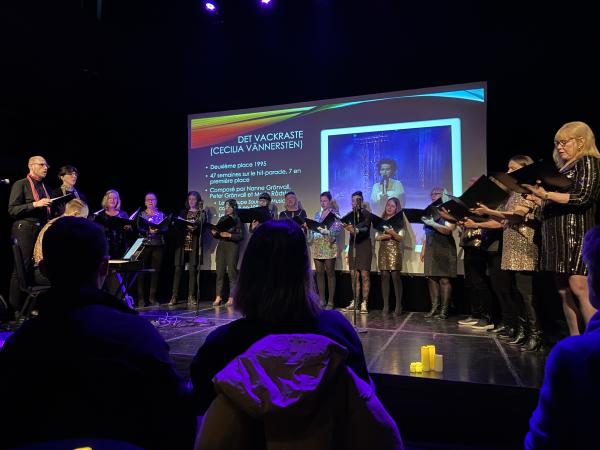Fika(s) Festival 2024: «Mello» with the Swedish Choir

You may have seen the bright pink and blue posters of the Fika(s) Festival around the city. As a Scandinavophile, I was surprised when I learned that this is a Scandinavian and Nordic cultural festival, in Montreal no less. Ta fika means to take a coffee break in Swedish, and the Fikas(s) festival proposes a series of films, talks, performances, games, and other events from March 9th to 15th.
As a dilettante student of Swedish, I opted to attend the Swedish Choir of Montreal’s event on the 10th at the Monument National on Saint Laurent, near the gates of Chinatown. It’s very rare that I should ever have the opportunity to practice my Swedish, let alone in song, and so I seized the opportunity. The Swedish Choir has been around most likely since the 70s, when immigrants from Sweden started to arrive as the country began to internationalize some of its companies. Composed mainly of Swedish-born people but including some others raised in Canada, they sing folk songs from the Middle Ages all the way up to the hits of recent times. Of particular interest is the annual Lucia Day concert, on December 13th, Sweden’s “other” Christmas.
The room was already dim when I entered, with candlelight, and fifty-some people in attendance. There were orange-zest scones on offer at the side. No coffee as far as I could tell, but a treat nonetheless. The choir would be performing songs from the TV mega-event Melodiefestivalen, on air since 1959, attracting some of the viewership on Swedish television. This annual event, a kind of pageant to vet candidates for Eurovision, is an interesting representative of Swedish culture. The choir director stressed that the key to Melodiefestival songs is their catchy tunes and sentimental motifs (love, beauty, togetherness). For those acquainted with Sweden mainly through, say, Scandinavian noir crime shows, as I am, this is not what one might expect of the country. Think of ABBA, not of the horror film Midsommar or the grey skies over Malmö, and you’re closer to the mark. Indeed, ABBA’s big break was at Melodifestivalen in 1974 with “Waterloo.” I actually don’t know ABBA well; it wasn’t something that was on in my house. But for anyone interested in the history of pop, Sweden’s gift for pure-melody and kitschy pop songwriting is the beginning of a story that goes from ABBA all the way to Spotify, and beyond in both directions.
It’s difficult sometimes for contemporary audiences to get on board with “sentimentality.” It can also be a struggle to get them to sing along, as was the goal at this event. It was amusing to see Swedish lyrics spelled out French-style to give the Francophone audience a hand in singing. All in all, it was a pleasant hour or so listening to some of the hits from the Melodiefestival catalogue. Who knows, I may join the choir and brush up on my Swedish.
If you are interested, the choir is recruiting, men and women. I do not know how much Swedish is necessary to participate, but the email is as follows: svenskakorenmontreal@gmail.com
Tack för att läsa!
Photo by Maia Sunnberg courtesy of Fika(s) Festival
Cal is the host of Hellespont, Tuesdays 2PM-3PM on CJLO 1690AM



